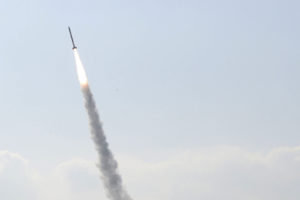
Japan has announced a significant commitment to developing its NewSpace sector, offering nearly U.S.$1 billion of support, according to a report in Japan’s Nikkei Asian Review.
Japanese news outlet the Nikkei Asian Review also claims that the Japanese government is considering amending its space policy and legislation to allow Japanese companies to exploit space resources on the Moon, which would be similar to policy initiatives made by Luxembourg and the United States.
On the financial side of this initiative, Japan has laid out a space business vision this fiscal year, aiming to double the scale of the sector to about 2.4 trillion Yen by the early 2030s, and nascent startups will be eligible for aid of up to 10 million Yen each to cover costs such as research and patent applications. Companies that show promise of bringing products or services to market will be introduced to investors and venture capitalists. Those at the development stage will be able to draw from a 100 billion Yen pool offered through bodies including the Development Bank of Japan and the Innovation Network Corporation of Japan, a public-private investment fund.
In recent years, Japan has been investing in more space startups, including Tokyo’s iSpace, which aims to develop lunar resources; the space debris cleaning company Astroscale that based in Singapore but with Japanese owners; and iQPS, a mini-satellite manufacturer. Thus far, though, there have been fewer than 20 candidates, and each has generally received just billions or hundreds of millions of yen, leaving Japan trailing NewSpace competitors such as the United States.
The U.S. government has cultivated some of America’s many space-related startups with subsidies and tax breaks. Space company Space Exploration Technologies, better known as SpaceX — headed by Elon Musk, the entrepreneur behind electric vehicle maker Tesla — is said to have received subsidies in the hundreds of millions or billions of dollars for development.
In addition to monetary aid, Japan will also create a human resource hub and consider a legal path for commercial development on the Moon.
An agency will be set up to connect startups short on professional talent with seasoned rocket scientists and systems operators from the likes of the Japan Aerospace Exploration Agency (JAXA) and Mitsubishi Heavy Industries (MHI).
The Nikkei Asian Review also claims that the Japanese government will consider devising laws and policies to allow businesses to own plots of land they develop on the Moon.
Expert reaction among space policy specialists to Tuesday’s claim in the Nikkei Asian Review is cautious, however, particularly regarding the alleged policy and legal review for owning land on the Moon.
“The language in this story is concerning,” said Daniel Porras, a space lawyer and the Space Security Fellow at the United Nations Institute for Disarmament Research (UNIDIR) in Geneva, Switzerland, speaking to SpaceWatch.Global in his personal capacity. “The U.S. Space Competitiveness Act of 2015 was very carefully worded to limit any claims of ownership to ‘space resources obtained,’ making it clear that a resource must be extracted and in the physical possession of the probe or miner or whatever is carrying out the activity. Ownership does not, however, extend to the plot on which the activity is being carried out.”
“Whilst it is still under debate whether the U.S. law runs afoul of Article II of the Outer Space Treaty (no claims of national sovereignty in outer space), granting ownership rights over a plot of land almost certainly would,” Porras continued. “Any Japanese legislation will very likely be crafted in such a way as to align itself more closely with the U.S. law.”
Kazuto Suzuki, professor at Hokkaido University, and noted Japanese space policy expert, also questioned the prediction of new legislation. “I think this statement is too far-fetched,” he said. “Yes, there are some politicians who support the activities of iSpace/HAKUTO because of the public exposure, arguing that there should be new legislation, but there is no serious movement for that.”
“At the Cabinet Office and the space commercialization working group of the National Space Policy Committee, there is no such discussion about new legislation,” Professor Suzuki added. “I think Nikkei’s statement is just a speculation.”


